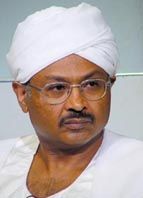Sudan’s judiciary needs reform – opposition leader
December 5, 2007 (KHARTOUM) — Sudan’s legal system needs to be overhauled to prevent a collapse of law and order in Africa’s largest country, an opposition politician who was detained for almost five months said.

“There is an urgent need to reform the legal system and the judiciary because it has been infested by politics,” Fadil told Reuters. “There isn’t going to be democracy, there isn’t going to be peace … if you don’t have rule of law.”
The joint defence team of Fadil and the other 27, which included other opposition politicians Ali Mahmoud Hassanein, Abdel Jalil al-Basha and retired officers from the army, police and security, said Fadil’s eleventh hour release left a weak case against the other detainees.
Sudan’s powerful national security apparatus had said Fadil was the coordinator of the alleged attempted coup. The charges against him were dropped by the Justice Ministry for lack of evidence.
Fadil spent six weeks in solitary confinement and was on hunger strike for 25 days. He emerged more than 20 kilos (44 lbs) lighter but with a calm and philosophical view on his ordeal. He said he expected the other detainees to be released.
“I believe that sooner or later they will be released and the whole case will be dismissed because they don’t have any sort of independent evidence,” he added.
He said those who confessed were tortured.
“They talked about beatings with water pipes, being tied up, they talked about making them stand on ice,” he said. “Some of them … were tied in chains and left to sleep in the open and with their eyes blindfolded.”
Amnesty International received written testimonies from the majority of the detainees saying they were tortured. The justice minister said he would sue the rights group and denied any coercion.
The arrests were also cause for concern in the international community ahead of Sudan’s first democratic elections in more than two decades to be held by 2009.
European and Canadian diplomats were expelled from Sudan after writing to the national security organ to enquire after the politicians. U.N. rights rapporteur for Sudan, Sima Samar, urged the government to act more transparently on the matter.
Fadil said the whole case was an attempt to frame him, scare off the opposition and distract attention away from domestic problems.
“The average age (of those under arrest) must be about 60,” he said, adding they were just too old to be able to plan the political assassinations and armed revolt the government had accused them of.
Fadil is very close to the leaders of Egypt and Libya and said he thought they had also pressured President Omar Hassan al-Bashir for his release.
Fadil is the cousin of Sudan’s last democratically elected Prime Minister Sadig al-Mahdi. But he split from Mahdi’s popular Umma Party to join government as a presidential advisor.
Following disputes with powerful National Congress Party ministers, he was sacked in 2004 and rejoined the opposition.
Sudan has reopened the doors to political opposition parties in recent years but many still complain of harassment. Opposition demonstrations have been violently broken up on many occasions and many opposition activists arrested.
(Reuters)
